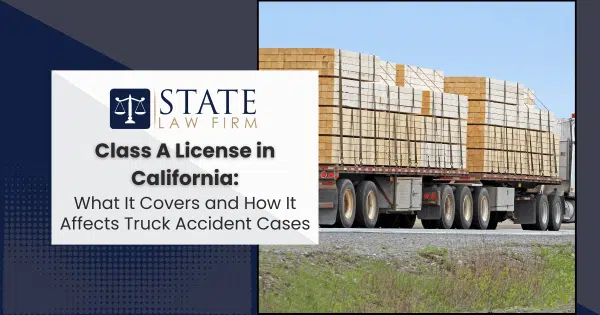California’s bustling highways are home to all kinds of commercial vehicles—but when a crash occurs, a Class A Commercial Driver’s License (CDL) often plays a pivotal role in determining what’s at stake. Whether you’re a fellow driver, an injured party, or just curious, understanding what a Class A license is, how it’s earned, and why it matters can make all the difference.
At State Law Firm, we’re a team of young, driven litigators—not your typical suit-and-tie office. We’re evolving, learning, and winning more complex personal injury cases every day. We want to help you do the same when navigating the aftermath of a truck accident in California.
Did you know that nearly 90 percent of truck‑related collisions are linked to driver error—things like fatigue, distraction, or misjudgment? That’s why focusing on driver qualification—starting with something as foundational as a Class A license—is not just academic. It’s about safety, responsibility, and justice for injured people.
In this guide, we’ll walk you through exactly what a Class A license is and what it takes to get one. We’ll explain exactly what vehicles you can operate, how it ties into California’s trucking regulations and safety standards, and—most importantly—how possessing (or lacking) a Class A license can influence liability, claims, and settlements after a truck accident.
We’re here to make this complex topic approachable—and, should you need it, we’re always ready to support you with the care and sharpness of a boutique personal injury law firm.
Need help after an accident? Our Corona motorcycle accident lawyers advocate for injured riders across the Inland Empire. And if you’d like a direct conversation, feel free to tap into a free consultation with us, too.
Understanding the Class A License: Definition and Requirements
In California, a Class A Commercial Driver’s License (CDL) is the highest level of commercial licensing. It allows drivers to operate the largest and most complex vehicles on the road. To qualify, drivers must:
- Be at least 18 years old for intrastate driving (21 for interstate)
- Pass a written knowledge exam and vision test.
- Obtain a commercial learner’s permit (CLP) before road testing.g
- Complete a skills test covering pre-trip inspection, basic controls, and an on-road driving exam.m
- Meet federal and state medical standards, ensuring they are physically fit to handle long hours and heavy machinery. ery
Consejo profesional: Drivers often invest in CDL training schools before testing. This not only improves pass rates but also demonstrates a commitment to safety and professionalism—qualities that may matter in legal disputes after an accident.
The Scope of a Class A License: Vehicles Covered Under This License
A Class A license isn’t just a “truck license.” It covers a broad range of commercial vehicles, including:
- Tractor-trailers (also known as 18-wheelers or semi-trucks)
- Truck-and-trailer combinations where the combined weight exceeds 26,000 pounds and the towed unit is over 10,000 pounds.
- Tanker vehicles, flatbeds, livestock carriers, and other heavy-haul rigs
- Some passenger vehicles, when paired with proper endorsements (like school buses or hazmat carriers)
Because these vehicles are massive and often carry dangerous cargo, the stakes are high. A single mistake behind the wheel can cause devastating crashes that affect multiple vehicles and families at once.
The Role of a Class A License in Trucking Regulations and Safety Standards
Commercial drivers are held to stricter regulations than everyday motorists. A Class A license isn’t just a permission slip—it signals ongoing responsibilities:
- Hours-of-Service limits: Federal rules restrict how many hours a trucker can drive before resting.
- Drug and alcohol testing: CDL holders face random testing under federal law.
- Vehicle inspections: Drivers must conduct pre- and post-trip checks to ensure safety.
- Specialized training: Hazmat or passenger endorsements require additional education and exams.
These rules are designed to protect the public. When a licensed truck driver ignores them, it’s not just a violation of law—it can become robust evidence of negligence in a personal injury case.
How a Class A License Influences Liability in Truck Accident Cases
Liability in truck accident cases often hinges on whether the driver—and their employer—upheld their licensing obligations. A Class A license plays into this in several ways:
- Negligence per se: If a driver without the proper CDL causes an accident, courts may presume negligence.
- Employer liability: Companies that knowingly put unqualified drivers on the road can be held responsible.
- Insurance implications: Commercial carriers often carry policies worth millions. Whether a driver was licensed correctly can determine coverage.
For an injured victim, these nuances can mean the difference between a denied claim and full compensation for medical bills, lost wages, and pain and suffering.
Consejo profesional: After a truck crash, always ask your attorney whether the driver’s licensing and endorsements were valid at the time of the accident. It may open new avenues for recovery.
The Impact of Driver Qualifications on Accident Claims and Settlements
Insurance adjusters and defense attorneys know one thing well: driver qualifications matter. A driver with a spotless record and proper Class A training looks very different in court than one with a history of violations.
In California truck accident claims, factors that can impact settlements include:
- Whether the driver held the correct CDL and endorsements
- Past driving record (DUIs, prior accidents, violations)
- Compliance with required rest breaks and logbooks
- Whether the trucking company provided ongoing training and monitoring
When qualifications fall short, juries tend to side with victims. Attorneys can use these facts to strengthen negotiations or push for larger jury awards.
Navigating the Legal Landscape After a Truck Accident Involving a Class A Licensed Driver
Truck accident cases are never simple, and a driver’s licensing status often plays a significant role in how liability and damages are determined. A Class A license is supposed to represent training, accountability, and safety. When that system breaks down, innocent people pay the price.
At State Law Firm, we pride ourselves on combining youthful energy with sharp legal strategy. We know how to dig into the details of licensing, safety records, and trucking regulations to hold negligent drivers and companies accountable.
If you or someone you love has been involved in a truck accident, don’t try to untangle these issues alone. Let us guide you through the process with the care and precision of a boutique firm that fights for its clients every step of the way.
Ready to talk? Start with a consulta gratuita hoy.


